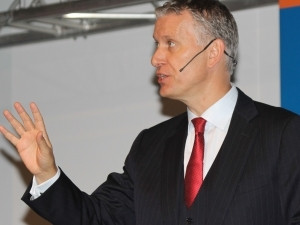
The move to a digital economy is no longer the hype of tomorrow, but a fundamental business shift well under way across the world.
Organisations face new opportunities and threats, and CIOs face "existential threats" as they struggle to balance traditional IT needs with emerging business strategies, said Peter Sondergaard, senior VP, Gartner Research, during the opening keynote at Gartner Symposium 2014 in Cape Town today.
"The nexus of forces [Gartner's view of social, mobile, cloud and big data] continues to reshape the market," Sondergaard said. "It has given rise to digital business - new business designs that blend the virtual and physical worlds. These define the digital industrial economy, and are redefining information technology and their markets.
"But more profoundly we are seeing it in human beings: your job, your workforce, your future - digital business is becoming a reality. Financial services institutions have turned customers into the experts, and dealers now mimic the portfolios of their most successful customers. The digital client is the expert. The CIO of Saxo Bank calls this the 'eBay moment for finance'."
Strategic change is finally getting the traction it needs, Sondergaard said. "We've spent decades convincing people that technology is the business, that it would help create new business. Often these pleas fell on deaf ears, but finally people have taken up the cause and now consumer behaviour has changed. That's affecting our businesses and people's lives. Humans spend more time in the digital world than they spend sleeping. They are digital first. Your customers will engage with your organisation in the digital world long before they see you physically."
Not lagging
South African and African CIOs often feel the local markets lag global trends, but this is not the case, Sondergaard said. "IT spending is up 2.1% globally; Africa more than twice that. But the global IT services market will hit $1 trillion in 2015, and half of IT services spend will be outside of IT. Today that is 38% globally - in South Africa it's 45% today."
That reflects business units outside the IT department procuring IT resources, typically in the cloud, without the involvement of formal IT processes. That trend is growing, and organisations should embrace it by developing a venture capital culture, allowing departments to explore new opportunities while IT offers guidance and oversight, rather than control. "By 2017, the costs to provide cloud infrastructure services will plunge 40% and competition will drive pricing down a similar curve," Sondergaard said. "It will be a fantastic time to be a buyer in the cloud. But will that buyer be the CIO?
"That means there is at least one existential threat to you as an IT leader: who is in control?" Sondergaard asked. "Your circle of influence is being challenged by the fluidity of the markets and the pricing of technology, infrastructure and software."
Never before
"We are seeing an unprecedented convergence of people, business and technology," agreed Rene Jacobs, MD of Gartner SA. "There are new revenue opportunities but also critical challenges for CIOs and IT leaders."
African businesses are in no way being left behind, she adds, and in some cases are driving the change faster than their international counterparts.
"Digital business is as relevant in Africa as anywhere else, but at the same time our journey is unique. Africa is poised to benefit from benefits of digital business. Seven of the 10 fastest growing economies are in Sub-Saharan Africa.
"By 2017, Africa's mobile subscriptions count will reach one billion, and more than half of the mobile money services in the world are in Sub-Saharan Africa." This is attracting global investment and creating opportunities for local companies, Jacobs says.
"But CIOs need to ask themselves whether they are taking advantage of these opportunities, or allowing the rest of the world to beat them to it."
Share